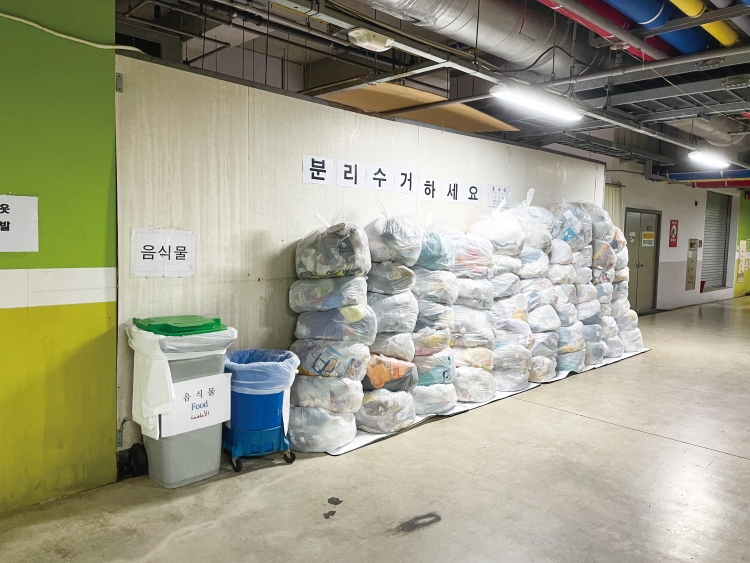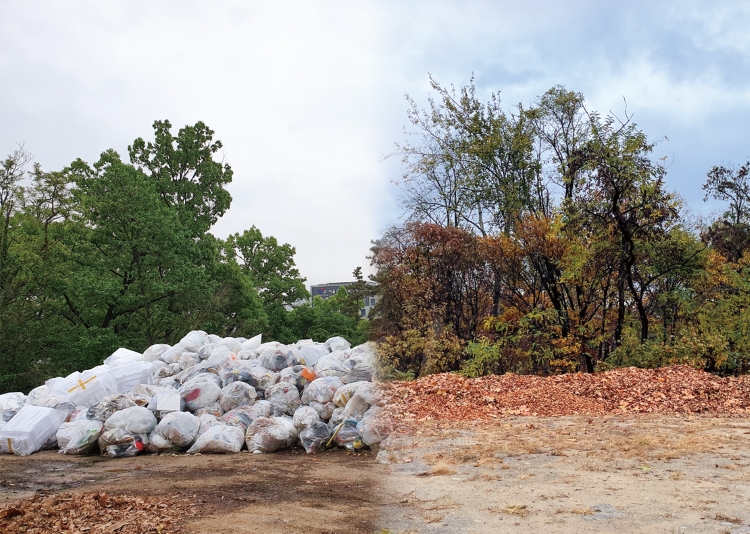
Contradiction in 'Eco-friendliness'
The current Korean government has declared that it will reach carbon neutrality by 2050. Accordingly, since last year, plans to close 10 of the old coal power plants have been implemented. However, seven new coal power plants are still being built nationwide in Korea. This is a contradictory situation. When in operation, the new coal power plants are expected to contribute an additional 48 million tons of greenhouse gas emissions per year. The United Nations recommends that greenhouse gases be reduced annually by 7% worldwide. However, with these new coal power plants, Korea's total greenhouse gas emissions are estimated to increase by about 7%. Jongho Hong, a professor of Seoul National University Graduate School of Environmental Studies, criticizes this situation as an improper position for a government that declared carbon neutrality.
As eco-friendliness becomes a trend in corporate marketing, 'greenwashing' has emerged. Greenwashing is when companies produce products that are actually harmful to the environment, but they wrap them into 'green' brands through eco-friendly advertisements. Starbucks Korea is an example. On September 28, Starbucks held a free reusable cup gift event. The number of cups prepared was about 1 million. The cup became very popular since it was a limited edition. During the event, the store served the drinks people ordered in a multi-use cup, and some stores had waits of over an hour due to a huge crowd of people. Starbucks promoted it on Instagram, calling it an 'event to deliver eco-friendly messages.' However, regarding this event, Mihwa Kim, chairman of Korea Zero Waste Movement Network, said, "It is not really environmentally friendly." Since the reusable cup is slightly thicker than single-use plastic cups that people commonly use, Starbucks recommends using it about 20 times. In the short term, the cup can reduce 20 single-use plastic cups, but it cannot be considered eco-friendly since it eventually becomes a large amount of plastic waste. Further, considering that one tumbler can be used almost indefinitely, this cup cannot be considered eco-friendly. In addition, all customers that day had to receive drinks in the reusable cup even if they didn't want to, so some people used their cup once and threw it away. Even customers who wanted to receive drinks in their tumblers were forced to receive cups. This induced unnecessary plastic consumption. Therefore, it is necessary to critically judge whether Starbucks's move to encourage unnecessary consumption of limited edition products is truly eco-friendly or not.
Doubts about Green Campus Project
Not only is the critical judgement of corporate greenwashing necessary, but also it is necessary to look at the Green Campus project with a critical view. The Green Campus project is conducted by the Korean Ministry of Environment (KMOE), targeting universities that engage in education and research to promote an eco-friendly culture and sustainable society. It is an active project, with a total of 45 universities designated as Green Campuses from 2011 to 2021. However, the projects have concerning aspects that may limit their effectiveness.
First, universities do not adhere to their green commitments after a project is over. Universities with the Green Campus designation receive financial support for 3 years to carry out eco-friendly activities. Once these 3 years pass, these universities should still maintain their eco-friendly standards through continuing management. However, among the universities designated as a Green Campus in 2017, all five universities were eliminated from reapplying for failing to maintain eco-friendly standards by KMOE's judgement.
Second, there is also a problem with the selection method. As background to the selection process, the number of universities receiving an award is determined by the budget. Each year, the Green Campus awards have a certain budget and designate a certain amount of that budget as an award for selected universities. Some years may see more or fewer winners based on the amount of the award and the total budget. The problem is the selection is not based on a certain standard, but rather focuses on the universities that have received the highest scores in the year they applied. This means that the actual quality of the environmental projects may vary radically from year to year. Outstanding environmental efforts may lose out one year, only for less ambitious projects to be selected in the subsequent year. In addition, since deliberation and evaluation are not open, the public cannot know the criteria KMOE uses to select the Green Campus universities.
SeoulTech's Environmental Problems
In March, SeoulTech participated in the GoGo Challenge, with the President of SeoulTech pledging to reduce plastic use. However, it seems steps to reduce the use of plastic and to recycle plastic well have not been realized. Many people still use single-use plastic cups on campus. It is easy to find plastic cups discarded around campus without removing paper sleeves, or even with liquid still inside. In this regard, it is questionable whether participating in the GoGo Challenge can be considered environmentally friendly since no meaningful changes have impacted the environment positively.
Korea has thorough procedures for how recycling should be carried out. General waste (except for food waste, recyclable waste, or oversized waste) should be put in standard plastic garbage bags. Food waste is put in standard plastic bags for food waste. These plastic bags can be bought in a nearby supermarket or convenience store. Recyclable waste, such as paper, plastic, glass, or can, should be separated by type and thrown out in different plastic bags. But food-stained items are not recyclable. The spaces for recycling are usually near one's residence.
We investigated the problem of waste disposal on the campus by conducting a survey targeting SeoulTech students. 35 students responded. The first question was "Do you think SeoulTech is eco-friendly?", and about 75% responded "Yes." However, when asked, "Is recycling done well on campus?", about 55% answered, "No." The libraries (both the Central Library and Central Library Annex) topped the list of places where recycling was not thought to be done well, and the dormitories ranked second. In particular, during most exam periods, someone posted on Everytime, a social networking site for Korean university students, that students should "Separate waste well" and included photos of waste that had not been separated well in the library. In such photos, single-use plastic cups were thrown away with the beverage or ice still inside. If many students continue to throw away their plastic cups like this, the trash will smell bad and bugs will be attracted. It takes less than a minute to throw the contents away in a nearby toilet or sewer. If there is no place to throw away the contents, drinking the entire beverage is the best option.
Throwing away food waste correctly is as important as recycling. When asked to 24 residents in the dormitory, "Is it necessary to add food waste receptacles in the dormitory?" 19 residents answered, "It is necessary." It accounts for about 80% of all respondents. Currently, around the dormitories, there are two food waste receptacles near the entrance of KB dormitory and in the underground parking lot of Sunglim dormitory. In the case of Nuri and Surim dormitories, students can use the food waste receptacles at the convenience store in each. However, if the food has not been purchased from one of the stores, it is difficult to throw that food away in those waste receptacles because disposing of such waste costs the stores money. Students are inconvenienced by the lack of food waste receptacles. As a result, some students said they often put food waste in the toilet and flush it. Unlike with liquid waste, this can not only contribute to blocked-up sewers and toilets but also cause water pollution. Also, since the dormitory is a space for people to live in, it is not practical to ban bringing food into the dormitory. It seems that appropriate measures are needed for this problem.

▲ A food waste receptacle and loads of trash in the underground parking lot of Sunglim dormitory
SeoulTech's Current Efforts to Solve Our Enviromental Problems
While SeoulTech still suffers some environmental problems like above, it seems to be making improvements. For example, the university has taken steps to address the problem of poor waste management at Chungun Hall. In May, an article titled "Our University's Poor Management of waste" was published in No. 646 of The SeoulTech Times, SeoulTech's Korean newspaper. According to the article, the trash near Chungun Hall was neglected, so general waste just piled up in the vacant lot near Chungun Hall. However, recently, a reporter from the newspaper provided an update that the waste problem of Chungun Hall was resolved. The reporter checked the waste disposal near Chungun Hall on May 14 and The SeoulTech Times issued an article about Chungun Hall's disposal problem on May 24. Then, after a few days, the reporter saw firsthand that the waste disposal near Chungun Hall became much cleaner. That date was June 3. Also, this resolution is currently ongoing.

▲ Pictures of Chungun Hall: Left is a picture on May 24 and Right is a picture on November 8. (Left picture by The SeoulTech Times)
The picture on the left is from the Chungun Hall waste articles. As the picture shows, the waste was not properly managed. In the picture on the right, though, it is evident that the waste situation has improved. This case shows that SeoulTech is listening to environmental problems raised by students and is trying to solve the problems with interest.
Concerning the problem that students didn't separate plastic waste during the exam period, in fact, in SeoulTech, environmental cleaners strive to manage it on weekdays. However, during the exam period, there are many students in the library, so there is too much trash, and environmental cleaners work only on weekdays, so fewer people manage the trash compared to the trash being thrown away.
There is another problem with the above-mentioned dormitory food waste. Students want to build a new food waste receptacle. To build a new food waste receptacle, there needs to be more than a certain amount of food waste per day, but the current amount of SeoulTech does not meet the criteria. So SeoulTech cannot install more food waste receptacles. Therefore, to solve the lack of food waste receptacles problem, it is the best to reduce students' food waste.
True Eco-Friendliness Requires SeoulTech and Students' Efforts
Like this, in order to solve the environmental problems of SeoulTech, university efforts alone have limitations. Therefore, SeoulTech tries to cooperate with both individual and university efforts. For example, SeoulTech should emphasize the importance of proper recycling to encourage students to voluntarily participate. In addition, policy considerations, such as hiring more environmental cleaners, are needed to solve the problems mentioned by the above student survey. Also, regarding the food waste problem in dormitories, in many cases, complaints arise because the SeoulTech Dormitory does not notify students where and how to process food waste, so they don't know the right food waste receptacles' location. Therefore, efforts like placing a sign or notifying about the process seem necessary. Accordingly, students should try to ensure that each individual can recycle properly from the beginning, and make personal efforts, such as reducing the amount of treating food waste incorrectly, so that environmental cleaners do not have to dispose of it later. One practical way to reduce the amount of food waste is to order less delivery food. Like this, if individual efforts are combined with SeoulTech's efforts, SeoulTech will be able to be a truly eco-friendly university as well as solve environmental problems.
Reporters,
Jaeyoung Kim jaeyoung@seoultech.ac.kr
Gayeon Han hgy1228@seoultech.ac.kr




 Comment 0
Comment 0 Posts containing profanity or personal attacks will be deleted
Posts containing profanity or personal attacks will be deleted